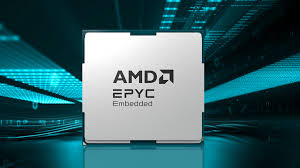AMD Unveils 5th Gen AMD EPYC Embedded Processors
AMD announced the expansion of its x86 embedded
processor portfolio with the introduction of 5th Gen AMD EPYC™ Embedded
processors.
AMD EPYC Embedded 9005 Series
CPUs are optimized for embedded markets, balancing cutting-edge compute
capabilities with purpose-built embedded features that enhance product
longevity, reliability, system resiliency and ease of embedded application
development. Powered by the proven “Zen 5” architecture, these processors
deliver leadership performance and energy efficiency that enable networking,
storage and industrial edge systems to process more data, faster and with
greater efficiency.
“AI-driven network traffic,
exploding data storage requirements and the expansion of industrial edge
computing are driving the demand for higher compute performance in embedded
platforms,” said Salil Raje, senior vice president and general manager,
Adaptive and Embedded Computing, AMD. “5th Gen AMD EPYC Embedded processors
bring leadership performance and efficiency to embedded customers, together
with the long product lifecycles and enhanced system resiliency they rely on to
design confidently and ensure continuous operations in demanding “always-on”
environments.”
Leadership Core Density, Performance, and Energy Efficiency
AMD EPYC Embedded 9005 Series processors are designed to power compute-intensive embedded systems with support for core counts from 8 to 192 in a single socket. Industry-leading core density delivers up to a 1.3X and 1.6X increase in data processing throughput for networking and storage workloads, respectively,1,2 making the devices ideal for network and security firewall platforms, storage systems and industrial control applications.
Using the new “Zen 5c” core
architecture offers higher throughput with greater energy efficiency,
delivering up to an estimated 1.3X increase in socket throughput3 and an
estimated 1.3X better performance/Watt4 compared to the competition. Capacity
of up to 6TB of DDR5 memory per socket and expanded I/O connectivity,
supporting up to 160 PCIe® Gen5 lanes with CXL® 2.0, enables storage capacity
expansion and high-speed data transfers for networking and storage
applications.
Purpose-Built, Application-Specific Features
AMD EPYC Embedded 9005 Series
processors include a suite of advanced embedded features designed to provide a
robust, secure, and long-lasting platform.
Extended Longevity: To meet the
longer product lifecycle and operational requirements of embedded markets, AMD
EPYC Embedded 9005 Series CPUs provide extended 7-year product manufacturing
support, helping system designers ensure long-term product availability,
reducing redesign and qualification efforts. Additionally, AMD plans to extend
design lifetime operation targets from 5 years on currently sampling AMD EPYC
Embedded 9005 Series CPUs, to 7 years for production SKUs, ensuring long-term
product stability for embedded systems. These extended design lifetime
operation targets are critical for embedded systems running mission-critical
applications in harsh conditions, minimizing unplanned downtime, repairs, and
costly system replacements.
System Resiliency and Security:
Features include NTB (Non-Transparent Bridging) for increased high availability
in fault tolerant multi-host configurations. NTB enhances system redundancy and
failover capabilities for networking and storage systems by enabling data
exchange between two CPUs in active-active configurations via PCI Express
(PCIe®) to allow continued operation in case of a failure. DRAM Flush enhances
reliability in mission-critical storage deployments by helping to prevent data
loss in the event of a power failure by flushing it from DRAM to non-volatile
memory.
Dual SPI (serial peripheral
interface) enables customers to load a secure and proprietary bootloader to
authenticate the platform, ensuring a trusted execution environment.
Ease of application development:
Built in Yocto framework support simplifies embedded system deployments by
enabling the creation of custom Linux distributions that are tailored for the
customer’s system. SPDK (Storage Performance Development Kit) and DPDK (Data
Plane Development Kit) enhance system performance by handling data processing
for network and storage workloads in user space drivers.

































Leave A Comment